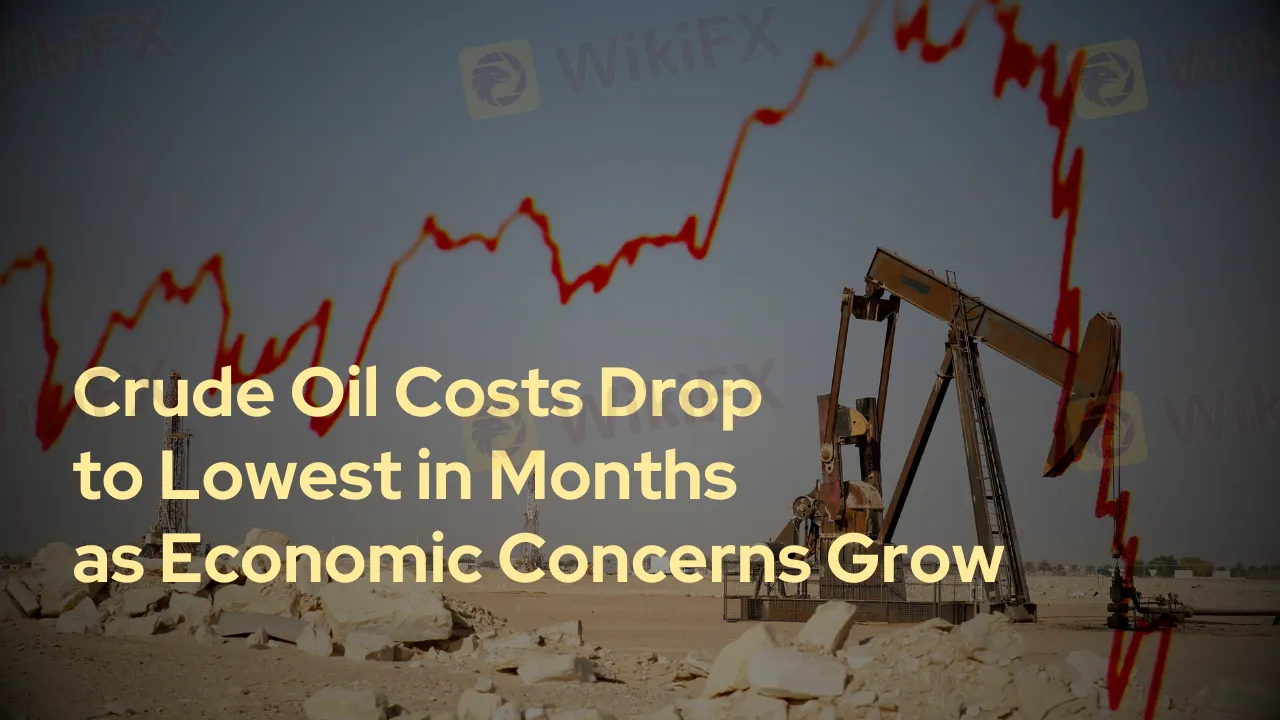简体中文
繁體中文
English
Pусский
日本語
ภาษาไทย
Tiếng Việt
Bahasa Indonesia
Español
हिन्दी
Filippiiniläinen
Français
Deutsch
Português
Türkçe
한국어
العربية
Crude Oil Costs Drop to Lowest in Months as Economic Concerns Grow
Abstract:Brent crude falls below $80 in response to growing economic concerns, impacting global stocks and signaling caution in the financial markets.

LONDON, United Kingdom – In a significant market shift, Brent crude oil prices have fallen below the $80 mark, reaching levels not seen since July earlier this year. This decline has introduced additional volatility into global stock markets, which have shown signs of struggle amidst growing concerns about the future economic climate.
On Wednesday, Brent crude, the international benchmark for oil prices, dipped over 2 percent, falling to a low of $79.80 per barrel, although it later saw a slight recovery. Similarly, the main U.S. benchmark, West Texas Intermediate (WTI), experienced a slump, dropping to $75.44 per barrel, which is also its lowest point since the middle of the year.
Market analyst Craig Erlam from OANDA points to dimming economic forecasts as the primary culprit behind the dip in oil prices. “With central banks taking a firm stance on keeping interest rates high to curb inflation, the demand for oil is expected to soften, further pressuring the prices,” Erlam explained.

The oil sector's downturn had a mixed impact on stock markets. Initially, the lower oil prices seemed to offer a cushion to stocks, but the benefit was short-lived as broader economic concerns took center stage.
In the United States, despite starting with modest gains, major indices like Wall Street faced difficulties, eventually leaning towards the negative. Patrick O'Hare, an analyst at Briefing.com, attributes the hesitance in the market to an anticipation of a pullback, further complicated by mixed signals regarding interest rates.
Last week's surge in Wall Street stocks followed signals from the U.S. central bank indicating a potential halt in interest rate hikes, alongside data suggesting the economy might slow down without entering a recession. However, the recent decline in market rates has prompted a debate about whether this is a positive sign of relief for businesses or a negative sign of a worsening economic outlook.

In Europe, stock performance was subdued with London's FTSE 100 ending slightly lower, influenced by the underperformance in natural resource and energy stocks. Meanwhile, both Frankfurt's DAX and Paris's CAC 40 closed with modest gains.
Asian markets concluded with a mixed response, and currency exchanges showed slight movements with the euro marginally up against the dollar and the pound slightly down.
As the markets closed:
The Dow Jones stood just under 0.1 percent lower.
The FTSE 100 was down by 0.1 percent.
The CAC 40 ended up by 0.7 percent.
The DAX was up by 0.5 percent.
In the commodities sector, Brent North Sea crude saw a 1.4 percent decrease, and West Texas Intermediate fell by 1.7 percent.
Bottom Line:
The current drop in oil prices below $80 reflects a larger worry about the global economy's health. As central banks keep interest rates higher to battle inflation, demand for oil falls, implying a difficult road ahead for the energy industry and a possibly gloomy view for global stock markets. In the following days, investors and market observers will be closely monitoring economic data and central bank actions to evaluate the direction of both oil prices and equities markets.

Disclaimer:
The views in this article only represent the author's personal views, and do not constitute investment advice on this platform. This platform does not guarantee the accuracy, completeness and timeliness of the information in the article, and will not be liable for any loss caused by the use of or reliance on the information in the article.
Read more

What Makes Cross-Border Payments Easier Than Ever?
Cross-border payments are now faster, cheaper, and simpler! Explore fintech, blockchain, and smart solutions to overcome costs, delays, and global payment hurdles.

Solana Soars to All-Time High, Hits $264 on Coinbase
Solana hits $264 on Coinbase, breaking its 3-year high with an 11% daily surge. Learn what’s driving SOL's meteoric rise and the crypto market rally.

Mastercard Partners with JPMorgan for B2B Cross-Border Payments
Mastercard and JPMorgan's Kinexys Digital Payments join forces to enhance B2B cross-border payments, promising faster settlements and greater transparency.

FCA Alerts Traders to New List of Unregulated and Clone Brokers
Protect your investments! Learn about unregulated firms flagged by the FCA and discover how WikiFX helps traders avoid scams and choose legitimate brokers.
WikiFX Broker
Latest News
Hackers Charged for $11M Crypto Theft Using SIM-Swaps
Role of Central Banks in the FX Market
FCA Alerts Against Sydney FX
What Makes Cross-Border Payments Easier Than Ever?
Trader Exposes Unethical Practices by STP Trading
Malaysian Man Loses RM113,000 in Foreign Currency Investment Scam
Bitcoin Nears $100,000: A Triumph of Optimism or a Warning Sign?
Mastercard Partners with JPMorgan for B2B Cross-Border Payments
FCA Identifies Clone Firm Exploiting Admiral Markets' Credibility
Coinbase Under Scrutiny Amid Wrapped Bitcoin Delisting Controversy
Currency Calculator


